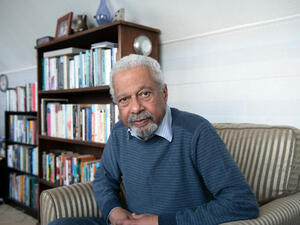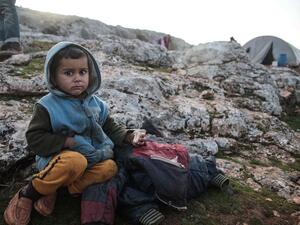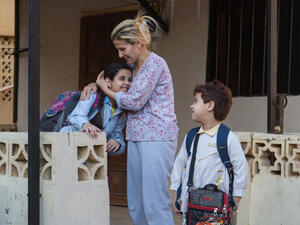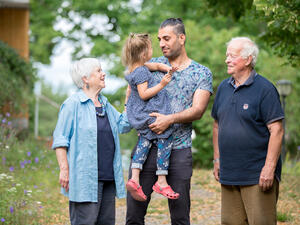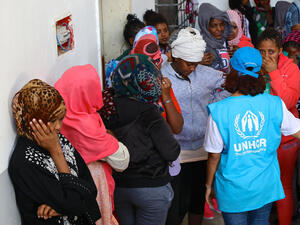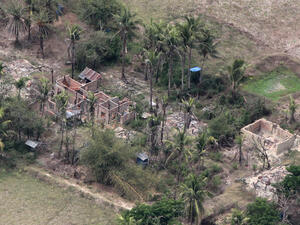Africa's refugees return home, international support still needed, says UNHCR Africa bureau chief
Africa's refugees return home, international support still needed, says UNHCR Africa bureau chief

UNHCR's Africa bureau director David Lambo briefing reporters in Geneva on progress and challenges a year after the March 2004 Africa Dialogue.
GENEVA, March 7 (UNHCR) - In March 2004, a UNHCR-sponsored conference in Geneva, known as the Africa Dialogue, brought together senior government officials from Africa, donor states and representatives of international organisations. All shared the same goal: to find durable solutions for Africa's four million refugees and bring to a close some of the most protracted refugee crises in the world.
A year on, more than 350,000 refugees have returned home, but there is a mixed picture ahead for 2005 with the potential success of some repatriation movements overshadowed by instability in some key regions.
The 2004 meeting focused on nine African countries where peace initiatives offered an opportunity for some of the biggest repatriation movements on the continent in more than a decade. Representatives from Angola, Sierra Leone, Liberia, the Democratic Republic of the Congo (DRC), Burundi, Rwanda, Sudan, Somalia and Eritrea briefed delegates on the situation in their respective countries and prospects for the return home of up to two million refugees and several million internally displaced persons (IDPs).
Briefing journalists in Geneva on Monday, UNHCR's Africa bureau director David Lambo said that much had been accomplished in the past year, but made a plea for a sustained drive to make returns work in the long term.
"It is essential that we get long-term support for the countries where refugees return," Lambo said. "Moving the refugees is difficult, but it is the easiest part of the repatriation process - the hardest part is reintegration, making returns work long term. And this is key to the success of the repatriation operation, without a doubt."
Lambo said that too often people who return home do not receive enough support after the initial period to be able to make a new start in their homeland.
"When a farmer goes back to land that has been neglected for years, it takes at least two years before he can grow enough to feed his family. If we do not help him during that time, he may have to move again."
Lambo said the largest voluntary repatriation movements were to Burundi and Liberia. More than 90,000 refugees returned to Burundi last year, most of them with UNHCR's assistance from neighbouring Tanzania. Political developments within Burundi are encouraging, with a long-awaited referendum held in late February that will pave the way for general elections scheduled for later this year. UNHCR estimates it will help repatriate some 150,000 refugees to Burundi in 2005, but the agency faces a worrying shortfall in the money it needs to carry out this operation.
"We appealed for $60 million for Burundi, where we repatriated 90,000 refugees last year, despite all the problems. Up to now, we only got $2.5 million in response to that appeal. This is obviously not enough."
Lambo also drew attention to Liberia, where more than 100,000 refugees have returned home in the past 12 months, and to Sierra Leone, where the voluntary repatriation operation was completed last year. He said now that 270,000 people have gone back to Sierra Leone, support for reintegration and long-term development is more crucial than ever to break the cycle of violence.
"We still have 75 to 80 percent unemployment amongst the youth in Sierra Leone, and this group is so important because many young people in West Africa know nothing but war and violence. If you want to create an alternative vision to war, then you have to put money to support this vision. If we don't restart the economy, then we won't break the cycle of violence.'
Lambo said UNHCR expected to be able to complete the voluntary repatriation to Angola with the return of some 75,000 refugees in 2005 from the camps in countries of asylum.
He drew a more mixed picture of developments in the DRC. While for the first time in years, the refugee agency is facilitating the voluntary repatriation of Congolese - from the Central African Republic and the Republic of Congo - to Equateur province in the north-west, many other regions of the DRC, particularly in the east, remain for the moment too unstable for facilitated returns.
Another country presenting a very mixed picture is Sudan. The situation in the south is hopeful. With the signing of a peace accord in January between the government and the Sudanese People's Liberation Movement (SPLM/A) ending nearly two decades of conflict, UNHCR hopes to be able to begin voluntary returns for more than half a million Sudanese refugees later this year.
By contrast, the situation in Darfur, in the west of Sudan, remains bleak. The two-year conflict, which has uprooted 1.8 million people and sent more than 200,000 fleeing across the border to Chad, is far from resolved. UNHCR has set up 11 camps for refugees in Chad and signed a Memorandum of Understanding with the Sudanese government to assist the displaced populations in West Darfur.
Despite these black clouds, Lambo said he was on the whole optimistic about developments to date and prospects for the year ahead - as long as international community remains committed to long-term solutions.
"In spite of everything," he said, "many people are going back to many countries. We must support them, we must work with them. With the (December 26) tsunami, we have seen how generous the international community can be in helping people who have lost everything to restart their lives. We must create the same momentum for African refugees."


